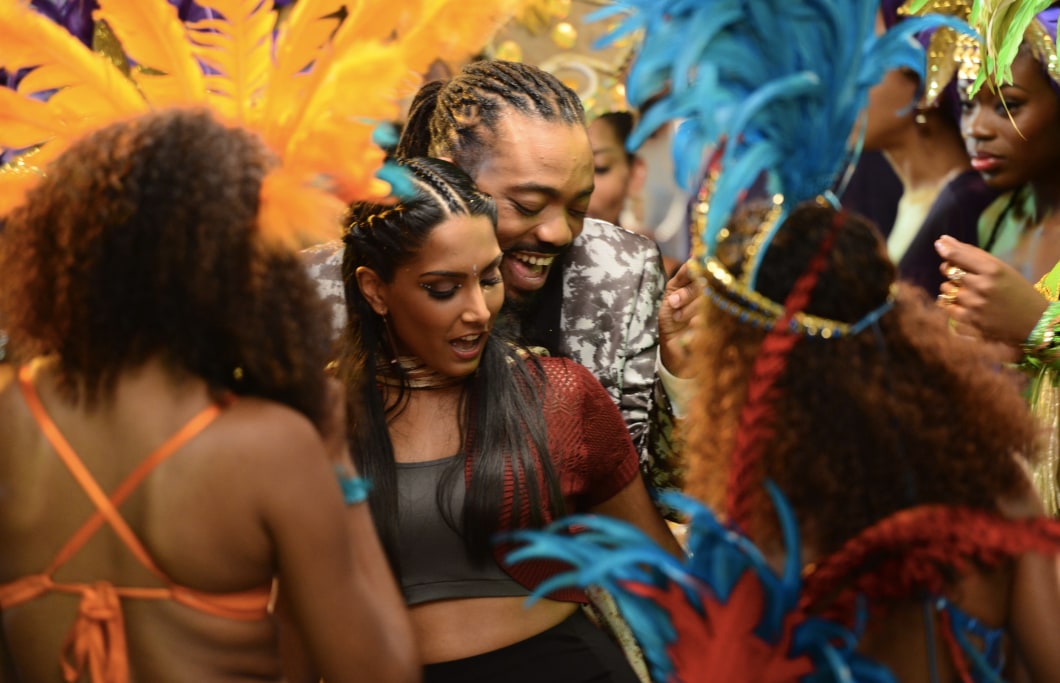Machel Montano has devoted his life to the cause of soca music. At age 41, and having been in the limelight since he began singing as a precocious 7 year old, his talents have long outgrown the island’s stage. He has sold out shows the world over, collaborated with artists from Nigeria to Norway, and, most recently, brought a little bit of wining to the White House. Montano has also sought to import Caribbean vibes to the west coast, spearheading L.A.’s annual Hollywood Carnival. This summer, seeking a new vehicle to bring soca music to the mainstream, Montano is making his U.S. cinematic with Bazodee, a feature film that's in theaters now.
Written by Claire Ince and directed by Todd Kessler, Bazodee borrows from the cinematic schools of romantic comedies and Bollywood musicals; the result is a Trinidadian stew of forbidden love. Set during the climax of carnival — Trinidad’s annual pre-Lenten festival of fêtes, music, and pageantry — the film follows the star-crossed paths of Lee de Leon, a down-on-his-luck Afro-Caribbean soca musician, and, Anita Panchouri, a well-off bride-to-be of Indian origin. Through its saccharine-sweet storyline, the film peels back the layers of carnival’s light-hearted revelries and digs into the some of the deeper social issues that boil beneath the nation’s surface — namely how tensions of race and class divide the island’s cosmopolitan society, issues that also came to a head during Trinidad’s 2015 election season. The FADER spoke with Montano about his acting debut and why he thinks soca can help to bridge the schisms in society.
The premise of Bazodee is pretty close to your real life. In what ways did you prepare for your acting debut?
When I first got the call and I met the producer and writer Claire and Ansel, they were really excited, so immediately I was happy. I was really inspired that they chose to write such a great story with my music. But when they left, I went into this state of dread where I was like, I have to act? Can I do this? I kind of doubted myself and I decided that I was going to need to prepare. I'm always the kind of person that does extra preparation, so I went and got an acting coach. I remember him coming over to my house. We had one beautiful session where he explained how to get into a character. I had that basic knowledge after one or two sessions. Then I didn't see him again because I had to go on tour.
A few years later, we found the director Todd Kessler, who directed Blues Clues and Keith. I said to him, “Look Todd, I'm excited to work with you. I want to take more acting classes. Can you suggest another coach?” And he was like, “You're a musician and this story is really close to your life. I don't think you'll need classes. Just understand the story and relate it to your life.” So I really started digging into it the storyline about this artist, Lee De Leo, who tried to make it in London, didn't succeed, and came home despondent. Eventually he got back into carnival and was re-inspired to make music because it made people happy — somebody rejuvenated his passion. This is my story.
Did you have a similar lull in your career?
Many. Maybe four. Especially coming out of London. I was signed [to a major label] in New York City by Ahmet Ertegun, who had signed Aretha Franklin and Ray Charles under Atlantic Records. They sent me to London to produce my album. I was working with producers who were really fast-paced. They were trying to find the 2-step sound or this next sound. They would say to me, “You're a mixture of Sisqo, Sean Paul, and the Caribbean Michael Jackson. Let's cook it up.” I always wanted to take it slow and explain what soca was.
For me, it just wasn't reflecting who I was. I couldn't get everybody to slow down and focus on where soca was, where I thought it needed to be, and what we needed to do together. So I went back home to Trinidad during a carnival when I really didn't want to perform. Somehow, I found deeper meaning in that return, in not being successful on my mission, but I found a way to kind of transform soca music, change the industry, and produce some of the best records of my career. So I was really able to tap into it and live that story.
Bazodee has some of the cinematic motifs of Bollywood films. Can you tell us about the importance of Indian cinema to Trinidadian television?
Well, it’s the importance of Indian culture first of all. Trinidad is 50% Indian. East Indians and Africans form the majority of people in Trinidad and Tobago, it’s pretty much the fabric of who we are. Growing up in Trinidad and Tobago, we have been challenged by unity. For me in 2000, I addressed that with the my song “Real Unity.” It's one of the songs that inspired Claire to write the story. We revamped it for the movie. In the film, I performed this famous old Indian song, “Aap Jaisa Koi.” For “Real Unity,” I took that original song and blended it with a little bit of soca music and dancehall and recorded it with Drupatee, who is a famous Chutney singer.
East Indians have clung to their traditions, their weddings, their Bollywood films. There are shows like Mastana Bahar that we grew up watching every Sunday. It's all of the real hardcore Indian influence and programming that Trinidad got directly from India. Trinidadians understand what it means when a guy is running down the girl, through the trees and gardens, and they're falling and rolling. We quickly learned that it wasn't a Bollywood film that we were making with Bazodee — it was a Triniwood film. We definitely want to tell this story on a large scale to Africans and Indians, but really project it beyond that to be about the Chinese, Syrians, and other races in Trinidad. Bazodee is about true love going beyond the boundaries of race.
 Bazodee
Bazodee
Typically in mainstream Hollywood, anything dealing with the Caribbean usually refers to Jamaica. If there's someone with a West Indian accent, it is most likely a fake Jamaican one. Given the work that you're doing with Hollywood Carnival and this film, do you think that Trinidad is ready for its close-up? Is the island finally ready for the spotlight?
I think Trinidad is making steps toward that. I remember the whole emergence of reggae music with films like The Harder They Come and Country Man. I remember being really excited watching how reggae music functioned in these films. Toots & The Maytals, Peter Tosh, Bob Marley — these are people that really put reggae music out there at that time when Jamaica was really putting out films. It became popular to musicians like Eric Clapton, Sting, the Rolling Stones, and the Clash. Everyone was influenced by reggae.
I think right now we Trinidadians are getting a chance. Soca music is showing up in afrobeats in West Africa, in Indian music, and it's showing up in the EDM world. The beats and melodies are showing up in Drake's “One Dance,” in Rihanna and Drake's “Too Good,” in Justin Bieber's “Sorry.” The music is starting to come to the forefront. We saw Trinidad and Tobago on the map back in the days with Calypso with Harry Belafonte. Trinidad had its day with the creation of the steelpan. Now we're seeing soca music as the gel that's uniting different people and sounds.
I think the debut for soca and Trinidad culture is, by extension, that of Caribbean unity. Soca is not just Trinidad anymore. The word soca is an acronym of the term “soul of calypso” but now I think it's changing to the emerging “sound of the Caribbean.” Now the world is slowly being introduced to another side of the Caribbean via carnival and soca. What we stress to do with Hollywood Carnival is to not make it just about Trinidad. We include Jamaica and Belize. I feel that this is the next step. It's not important for us not to fight for our flags, but to fight to hold each others' flags and create something that's multicultural. Soca is a music that can embrace that type of vision.
Trinidad’s need for unity is something that you addressed in your song in 2000, yet recently there was a falling out over a black man taking office. The 2015 election in Trinidad caused a social schism between African and Indian populations with Keith Rowley’s arrival and the departure of previous Prime Minister Kamla Bissessar. Can you tell me your thoughts on that? Do you feel that Bazodee speaks to that?
I have lived through a couple elections. I have seen that movie before and I know that there are alternate endings. As a society, we have been going back and forth: government dominated by East Indians and government dominated by Africans. There's always a time when one government is in power and one is on the rise. Similarly, the election that's going on in America is causing a lot of racial division. The point I'm making is: the closer we come to unity, the more we'll see division. Every time we get closer and closer to the point where we have to unite, there will be a greater force trying to separate us.
It's like my understanding of the Hindu book, Bhagavad Gita. [The prince] Arjuna says sometimes it takes war to bring peace. So I think that situation in Trinidad is one that has happened before. We've had the same fight on the other side when the Indian government was going into power. I really think that we have greater opportunities today. We have greater tools, such as social media, where we can hear different voices and put our fingers on the feeling of the nation in an instant by watching social media and seeing how people react to certain situations. I think that closer we come to solving it, the greater the force will be to pulling us apart.
In the film, Lee and Anita’s forbidden passion climaxes in a pivotal scene that’s set during the J’ouvert of carnival. What is the spiritual significance of J’ouvert?
J’ouvert is one of the festivals like Dia De Los Muertos, or Halloween, where people dress up like the dead or they dress up in darkness. J'ouvert is a time for darkness to reign. It's a time for people to play a devil or jab jab mas, something that would seem to be scary, but it's really about you facing those demons. That was the scene that I mentioned to you earlier, where the darkness actually comes to light. The scene that caused love to take action and save the lives of the characters. It was really synonymous with what J’ouvert means, you go there to wash away your darkness.
It's also a bringing together of the classes and races, because rich or poor everyone is covered in paint, powder, and mud.
Ideally.
